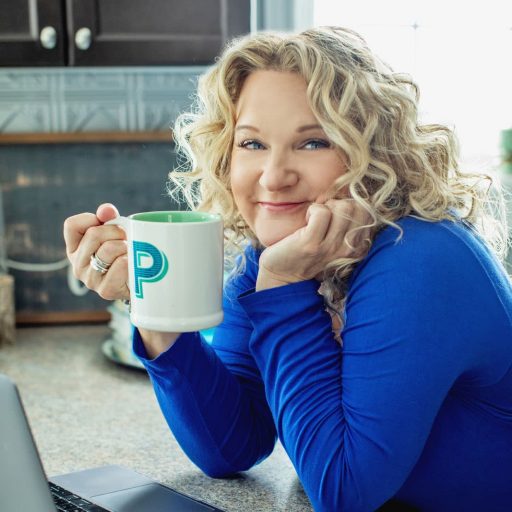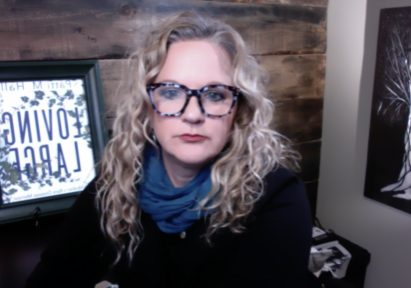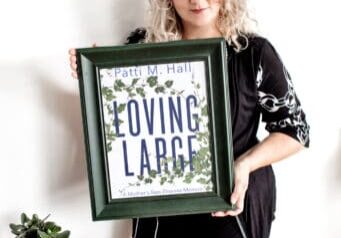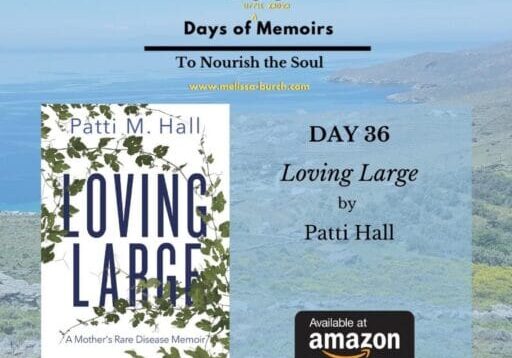by Patti M Hall
Memoir #1: Overcome your barriers to writing your story with Patti M Hall
A Memoir Series (part 1) with Sandy Reynolds on Reframe Your Life Podcast
Transcript, excerpts, notes:
{1:40}Sandy: What barriers do people have when it comes to memoir writing? What stops people from writing their story?
Patti: All of them are in their own heads, is the short answer. We all get stopped, and we probably all wait about 10 years before we start. We have to first of all live the experience, then you go to dinner parties and hear “hey you should really write that book”. Then you mull on that and then all that nasty self-talk starts to creep up. Why haven’t you guys started? What do you hear in your head?
Everybody hears this. I’ll give you a couple of mine. Every memoir coaching session starts this way. We always start by having to straighten this out: “I’m not famous, I shouldn’t write a book. What would anyone want to read my book for? “
Jo-Anne: That’s like me. Not that I’m not famous, but who wants to hear my story? Is it exciting enough?
Patti: I know this is how we hear how cruel we are to ourselves. Okay Sandy, what’s your thing? What’s in your head?
Sandy: I wouldn’t know where to start. I think that’s a big one for me. I’d love to write my story but it’s overwhelming, but I’d have no idea how to go about starting it. It’s inexperience. How do you do it? All of those kinds of things.
Patti: Let’s start somewhere we can all agree on; the power of story. So let’s start there. That stories have always been told. We continue to tell stories, whether we invent creative myths for our children about birds that come alive to rescue them from a rising storm. We create stories for comfort. We tell one another stories in order to keep our memories alive. There’s nothing more gratifying than the story about grandpa who survived in the mountains of Italy during WWII. There’s nothing more exciting than that for any generation that they came from the stuff of such strength and resilience. We tell stories to comfort, to add legacy, but we more than anything, do it to teach one another that we are not alone. Whenever someone comes to me and says I don’t know if I can write my story because, I can’t this because, or I shouldn’t because. I always turn it around it and say, think about what your story can offer to someone. And that’s where these thoughts start to break apart. If you see your story as being a service for someone, first of all you, and secondly someone you might share it with. Then you start to see how petty and really not very kind some of these grievances that we have in our head. For example, who cares if your story isn’t exciting Jo-Anne, what if your story isn’t exciting by someone’s standards but rather inspiring. And a story of survival, and a story of how moving cross-continental and around the world has brought you great joy and excitement. And they’ve always been too scared to move 10 miles away from home.
So what if the service of your story is to say, Hey you’re not alone, I totally relate to you even though we’ve never met, and I offer you my story as a way to look at your life in a different way. And that starts to break down a lot of those misgivings we have about telling it, when we realize there is sometimes a purpose to story-telling that isn’t about us at all. It’s about our feelings of satisfaction and clarity that we get from the telling it. But stories are received by someone. Whether or not we think there will be an audience, sometimes the only audience is the cosmos, you know when we’re writing two years in a dark room. But even that has a purpose. We’re thinking and analyzing as we’re writing the story. And then we offer that up to a potential reader and audience one day. And I think that starts to break it down to a few less harsh judgements.
Then there’s the one Sandy mentioned, let’s tackle that one. “I don’t know where to start” I have an easy answer for that too. Start with what bubbles up repeatedly. Start with the story that you can’t put down. Start with the story that comes up at every dinner party that shows up in your dreams. The one that the minute you’re on a quiet train ride, that you have a moment to yourself, that you think of. For some people, those are the moments in childhood when you dreamed of being a writer someday. Or the glimpse that you got of wanting to live in the Australian outback when you were 12 and became fascinated with Australia. Or it’s the day your mother passed away. Or it’s uncompleted things, like I didn’t finish that degree, I wish that I didn’t have to leave that job. Conversations that you didn’t have. Things that bubble up for you. That’s where you start. You start because it’s pressing. Things that press themselves to the surface almost always have a greater reason than we’re ready for. And honestly the best feeling in writing your story is getting that bubbling cauldron of soup down on the page. So you can clear your head. For me that’s where you start. You start with what’s easy. {7:30}
{7:35}Sandy: A question along that line, how do you know when it’s time to write your story. Like what’s the right time? Obviously I’m not feeling like I’m too young to write my story, but maybe I’m feeling like I’m too old to write my story.
Patti: Right. The one thing I would say is that you’re never too old. But I have seen stories where people start to write them too soon. So regardless of your age, for example, I’ll use my own illustration here: I have recently rewritten one of my own memoirs, a book that I’d written and then had to go and re-write. The reason that I did that was because I wrote the first draft too soon. The book was more about what I was going through rather than what how I was managing to get my head around surviving it.
What you want to make memoir good. You want memoir to operate on two levels. You want it to operate on the story level with great scenes and gripping dialogue. And descriptions of things that you went through. But for it to be really relatable for people who haven’t been through your experience you want it to operate at a thematic level. So for my story I had a sick child, I did everything I could to help him survive. I wanted my story to be about the resilience of a woman who was confronted with this massive thing she didn’t know how to compete against. I had to rewrite my book to get it there. Because when I wrote it too soon, too early after my son’s diagnosis, my book was all about the medical stuff, it was all about what I was embroiled in. And that wasn’t going to be relatable for a woman whose child was born with diabetes, for example, and it also wasn’t going to be relatable for someone who was going through divorce. I realized until I pulled the day-to-day, the really down-in-the-muck stuff of my story away, I couldn’t really analyze what I’ve been through. So you can write too soon, but you can never wait too long to write the story – is my answer to that one. You can never be too old, because we only become better writers as we age, thankfully. It’s one of those things we do better as we age. Isn’t that great? Because you hone your craft. Because you’re polishing and crafting every time you open your mouth. Every podcast you do, you’re practicing your writing. So in answer to your questions to that, now is quite likely the right time, because here’s the irony- if you can ask ‘is now the right time’ chances are it is. Because if it’s too soon you’re going to be too mixed up in the stuff you’re going to even think about writing the story. My guess is, the time is now. {10:27}
{11:37}Jo-Anne: To start, I get it, we start with what resonates to me. And what point do you start with what the reader wants? And as you start, you’re writing gets better?
Patti: Both are true. So, your writing naturally gets better. I like to use the metaphor of carving. As you start you take a block of wood, you chip away with the big clunky tools first, then you work into these fine scrapers and gouges as you get into the detail. So of course, your writing improves but the writing quality should not be your concern early on; you really have to try not let that be a concern so early on. That is for later, that is for much later because the greatest challenge for memoir writers is getting enough detail the first time around. And that means controlling all of those voices inside your head that you hear right now. ‘Oh the writing’s not good enough’ ‘oh they’re not going to want to hear this’ ‘Who’s going to care about how many times I went to the doctor before they figured out what the scratch was on my face?’ You have to tone those voices down early on. This really is where the self-kindness part comes in, where you say ‘I just need to give myself time to get a chunk of this on the page’. The writing catharsis, the emptying yourself of this memory that has been bubbling up this entire time — if that can be your focus early on, it really stands in you good stead for the rest of the writing process. Which is pretty arduous, to be honest, but for people who are listening in, and for you two who haven’t put pen to paper, the goal is to turn the tap on. To get the tap turned on and to get yourself lots of time for later to decide is it good enough, is interesting, is it what the reader wants? {13:37}
{13:40} Jo-Anne: I love that, because when you said write it for you. It’s a journey, it’s a process, so it may be written and never actually need to be published. It all depends what people get from it on their own journey.
Patti: Right. Writing is – there’s a reason that humans do it. I’m convinced we have these massive analytical brains and we have nowhere to put the product of our own self-analysis. Writing becomes one of those emptying out processes for us. That’s more than enough, to know that you got it down is such a victory in our lives. First of all to take the time, but also to have the ability to analyze without judgement, without wondering if someone is going to see it, just to get down the Hoorah I Survived, it was hell but here I am now. Even if you don’t know what it means, the relief of getting words on a page. I have never in my million years’ experience with this this, I have never heard anyone say ‘I wish I didn’t write it down.’ It’s always the opposite. Always. If you can just think it out loud, say it out loud, you’ll realize your fears are about something else entirely. Almost in every case, if you present me with a fear like ‘what if the writing isn’t good enough’, I’ll say ‘How do you know it won’t be?’ – You just can’t know. You can’t know how good it’s going to feel, you can’t know how compelling your story is, this is a little bit of a crisis of faith, but only on the first page. Because once you’re writing, the writing is so magnetic that you’ll just keep on going. I promise. If you can get that first little bit of writing done, everyone says wow this is really cool, this feels really good. And 250 pages later you have a book sometimes, and if you don’t, then what you have are pages and pages of thoughts that are no longer unclear in your head, they’re very clear on paper. {15:51}
{16:15}Sandy: One of the barriers I have is, in telling my story, how poor some people that I care about are going to appear in my story. They’re not going to look so attractive. And I thought what do you do with that, it’s your story, but maybe your parents were the greatest people. They were doing the best they could but they definitely fell short, but I’m a feeler and I don’t want to hurt them.
Patti: Yes, it’s your story and you said that. This is where farther down the line the writing/editing becomes really important, and the word smithing, and much later in the writing is where you decide how much is relevant. And I always hesitate to include those character sketches of other people in my writing, and now that I’m deep into my second memoir, I realize that I just have to show a little of other people. I don’t have to say judgey words. I don’t have to say so-and-so wasn’t the cousin I wish they were. I just have to show myself in action with them. And let people figure out what they think. And this is a trend in memoir that is helping people get past the not wanting to project negative aspects on the people they love. It is the best way to show these people to the best of your memory and to leave it at that. And this is the great thing in writing, both fiction and nonfiction, is that you present the show, you present the scene and dialogue, or the experience that was endured with somebody and let the reader see what they think it all meant. So, you might have the experience that you were too chastised by your grandmother … you simply present yourself being chastised too harshly by your grandmother and leave it at that. In memoir you rarely say, because my grandmother was so harsh to me, I decided to never have children. You never need to say those things. Because later, should the reader see that you made decisions about children or grandchildren of your own, that may or may not have been coloured by that experience, and they want to figure that out themselves. So while you have control over what you talk about in your memoir, you don’t have to fully control interpretation. You can just present the facts, and you can do that with as little or as much detail as possible. And the caveat I always have to this is pretty blunt. It’s your memory and it’s your story, just present it as kindly as you can, and be accurate. Let the reader figure out what they think it all meant. You can’t let this stop from writing a whole book, when you look at it logically you might be talking about a couple of scenes in a string of one hundred scenes that will be the content of your book. And no one goes into compelling memoir writing wanting to ruin someone else. They go in to tell their story. And the accuracy of that is why people read it. Because they can relate to the fact such as tender experiences of Grandma was a little harsh to me when I was eight years old- those are really relatable things, and those are in good service of the human community when we say, Hey maybe you went through that too. Just by presenting it, let the reader figure out what they think. {20:03}
{22:14} Patti: Nobody expects for a life story to be perfectly tidy. In fact, I’m not convinced we’d want to read them if they are. And relatability means that we’ve been through something similar, and it doesn’t have to be exactly the same. I want to be able to say, I want to read your memoir and say I didn’t go through a crisis of faith over this or a relationship breakdown over that, but boy do I understand the heartbreak that she felt. And that becomes the truism that gets people from the beginning of the book to the end. Holding a great respect of our memories, regardless of our age is something that we have to do. {22.46}
{23:58} Patti: Making peace with it is the goal of our life and of the writing. Especially if it’s our story to tell. This is an ongoing one, and it isn’t an easy one, everyone that I work with has concerns about what the impact of their words will be. And you have to have an incredible sensitivity around it and that will bring in good stead. {24:18}47
{24:20}Sandy: How much time would I have to do this? There’s that question is this going to take three years of my life? That can be a barrier as well. Would I be able to stick with the process?
Patti: Well, I’ve seen it happen. This is where I became addicted to coaching. I got a coach early on in my writing career, and then I got a writing partner, then I found a writing group that I worked with because I found that it was very lonely. I couldn’t see the goals anymore and I would talk myself out of keeping on writing. When you’ve lived your story, and then you try to write it, it’s just too much to sit with it day after day. If you have the luxury of telling yourself, okay here’s four months I’m going to write my memoir, chances are you’ll do some of that. And you’ll probably make a really good start at it, you might even get yourself half of a memoir manuscript. But you’re going to have questions that remain unanswered if you try to do it in complete isolation or alone. And this is where I always say to people, don’t talk about your story to just anyone, go to someone who you can trust to give you really objective feedback. Don’t ask your husband what he thinks about your writing, don’t go to a family member, what you need is a team member. You need someone that will say Wow I just read your chapter from last week, send me what you wrote for this week. It is awesome to have a writing partner. I just found somebody that would help, and it doesn’t need to be a paid coach. The next time somebody says, why don’t you let me help you? Just say yes. You have no idea how great it is to have the support to send an email to someone when you’re spinning your wheels. But how long it takes, a book takes 18 months or 2 years. That’s a nebulous as anything else. That implies that you have a full life and will be working the rest of the time.
So a pre-writing phase comes in here, Sandy, in answer to your question. It’s doing some work in advance of the actual writing, in order to speed up the writing. And that’s mining for material and harvesting your memories.{27:10}
{27:23}Patti: This is where letting the tap turn on and letting it run for a while. This is where we’ll get to, because when you’re afraid you don’t have the time… The intimidating part is where you’re sitting with a blank notebook. I always advise people to start with a few basic pre-writing lists. Lists of memories that keep bubbling up, things that you absolutely feel that your story has to include, in order to capture everything that you want. Where would it begin and end, time wise? What will you include and not include, do all of this brainstorming stuff that you can do in the car or in bed. It’s already at the front of your mind anyway. I always say before you worry about how much time it’s going to take, see how much material you’ve got and how accessible the material is. Some people have to go back and do research. Some people have to go and interview grandparents. But if it’s top of mind memory stuff, if you need months at the minimum to do it, but nobody has to write their memoir full time unless you’re like me and it’s your profession. I’d like to see you not put a time limit on it, except to say something like ‘Over the next couple of years, I’d like to get the material for the first draft of my book.’ That’s a nice kind of open approach. But if all you want to do is spend the rest of your life writing about your life and people come to me in classes, library classes that come to me, ‘I really feel inspired to write about my life.’ And they just start writing. If you can just start writing without the goal of a book … I try and tell people to roll that ego back a bit and say ‘what do you want to write about that would just feel good’ – If you start with the feel good, you can never go wrong and it always makes it go faster and you know if you knew it was going to feel good to write about your memories every day, you’d probably go to your desk a lot more willingly. {30:02}
{30:25}Jo-Anne: Instead of thinking ‘Oh my god here’s this big book’ I’m just going to chronicle and journal some of my life every week.
Patti: It’s a great way to release yourself from the pressure of writing a book. I always hate that big nasty label of I’m writing a book, because it’s intimidating, it’s an over commitment – none of us really know what it means. Nobody wants everybody to come back to them and say ‘how’s that book going?’ and journaling to memoir is exactly how I’ve written my first two memoirs. I had stacks and stacks of journals and I just put everything in them because really I didn’t know where else to put things. Like how scared I was, or yet another sleepless night, I didn’t know where to put that stuff. So the journal is exactly where you put that stuff. And this first stage of pre-writing that I talked about where you harvest materials, some people call it mining their memories. What I have always done, is I always go back to my journals. To first of all remember what happened, remember feelings, remember frustrations, and then you can almost always lead your memory down the garden path into something bigger. And journaling is the first best exercise for memoir writing, it is the content of every memoir. {31:57}
{32:26}Patti: We often need something to hook our memories with. This is how long term memories work. We often pack our long term memories away until a colour, scene, memory, or smell brings forth the entire big picture and one other thing I have people do to prepare is creating a timeline for their lives as a way of harvesting memories chronologically. I also have this master memory list that is going on, by going to get your journal and pick a period of your life that you feel most compelled to write about and try to remember exactly what happened that year. Even if it’s a tangible memory, the selection of memories that comes with that is exactly what your memoir needs. And wherever you have to go for your memories, if you’ve got journals, literally it’s like having an archive of your life. It’s a terrific resource.{33:29}
{34:15}Jo-Anne: Who writes more memoir, men or women?
Patti: Well, I was reading recently. I’ll tell you honestly, I’ve been doing research on this. There was an article came to me through someone that reads my memoiraholic posts. They said ‘Did you know that memoir used to be the perview of men traditionally?’ This is what I’m researching, how the genre memoir has broken away from or become its own out of a mélange of other genres. I have some very early memoirs that were recommended in a post that the divine Elizabeth Gilbert mentioned that inspired her. I went back and I found them. And in finding analysis of these early memoirs, what was interesting was that I found some writers who said that early on memoir was about men and this was not necessarily great men writing their autobiographies. Because it was a period of time when men were a much larger proportion of the published authorship in the world, particularly in America. Because in the US is sort of where the publishing statistics are most readily available historically. It was more commonly men, I’ll tell you that now, I feel that it has become much more skewed towards women but I’m not sure if that is my preference and the world that I live in, or the fact that my social media outreach seems to have a lot more women in it than men and I would absolutely love anybody to email us on this if they actually have facts on this. Because I believe what we’re looking at is a trend that has followed a shift in social justice. That by the same token, say in a period of time where we did not have great diversity or equality in our social justice I expect we were seeing books written by fewer marginalized people and a lot more mainstream authors and now I hope what we’re seeing is that those that have been traditionally marginalized are becoming stronger voices represented in conventionally published memoirs. I don’t know if that’s my preference, but it definitely a passion of mine. But I’m not sure that I can prove it and I’m literally researching this now to try and figure out if the number of titles that would have been classed as memoir, say in the 50’s as opposed to in the 90’s or the 2000’s, if there has been this kind of shift in the gender proportions. I’m not sure, certainly what we could see if we looked at the memoirs that have been turned into movies over the last 50 years, and I bet you we could see the trend is quite well evidenced. And if we look at the movies produced in the last few years of memoirs that turned into movies we might be able to see more so-called her-stories than his-stories that have been represented.{37:34}
{39:07}Jo-Anne: Should every story be shared? Should every memoir be published?
Patti: To clarify the comment I made, is the criticism is that anyone can write it and get it published, and that memoir isn’t really this sort of high quality which I vehemently disagree with. So should everyone be published? No. Only really good writing should be published. I’d be remiss to say otherwise but I think self-publishing is a tremendous invention for people who have a purpose in mind that they’re so clear on and so passionate about that they just want to see their book out there, and I work with those people all the time and I fully support the self-publishing movement and for all I know someday that will be for me. I have ghost written books that have been self-published and I am proud to have my name on the cover and what I often do is say to people – What’s your vision? If your vision is: I want to see my book on the Chapters or the Barnes and Nobles shelf and I want to get it in the hands of 2000 people who have been rape victims or abuse victims — if that’s the vision then I say, you should go for that. Because I truly do think that behind everybody who puts pen to paper there’s a little tiny secret dream that the person has that their writing might be more than they think it is. I think that whole ‘I really want to be a writer someday’ might be the most common pressed down dream in human society. Every little kid, every teenager, every twenty something, and certainly all the fifty somethings I know – are saying it has always been on my bucket list to write a book. And I will always say ‘how far do you want to see your book go?’ ‘Or do you just want to write to tell your story?’ And nine times out of ten people want to get their story down so that the memories aren’t lost. I think that is the most terrific reason to write of all. I’m thrilled to help people just harvest their memories and teach them how to more fully tell stories. So that the really compelling details aren’t lost.{42:13}
{42:44}Sandy: I think being able to print a copy of your book is great, it allows people to really specialize in a certain area that might not have broad appeal but those people who are interested in that can find that material.
Patti: It’s a wonderful life goal to see fulfilled relatively affordably and you know if you sell a few hundred books a lot of people recoup the costs of printing. It really is an affordable thing to do. I know all kinds of people who have even gone on to conventionally publish later started by creating an ebook that sells on amazon kindle or then they create the print on demand version if someone wants to hold the book in their hands. I think these are all tremendous goals to have especially if the writing is the thing that you love and you really don’t care what happens to it after and at least half of the people who are listening today are saying ‘I just kind of want to write, I don’t care if anybody ever sees it.’ Because writing in of itself is the most joyous thing and it’s so nice to get things out of your head and onto paper and everybody tells me that, once they start to put things on paper. If you just want to see it printed up and beautiful and in a bound book. There are these really affordable ways to do that. I think it’s tremendous. {44:04}
{44:30}Jo-Anne: What’s the difference between an autobiography and a memoir?
Patti: Great question. Awesome question. Memoir is just a book based on memory. An autobiography by definition is a biography; as in life story written by the person who lived the life. Autobiographies are typically the entire life of a person. Memoir came from memories, as in assembled memories of a person. An autobiography, an entire life story, includes everything; sometimes ad nauseam, and quite often is a well-known person.
A memoir is a story built around a theme, quite typically, a time’s in one’s life that is being conveyed for the purpose of relating a particular story that might be about survival, resilience, courage, inspiration. So there’s almost always a theme and it’s usually a confined period of time even if it’s a lengthy period of time. For example, I have a memoir that is an intense 18 months yet it covers 8 years. The whole thing start to finish is 8 years. That typically is a memoir. It’s themed. And the writing style is typically different as well. Memoir is typically written in a journal style with an intimate retelling of scenes, and story, and dialogue, and characterization that’s closer to fiction than autobiography. Autobiography quite often has that formal kind of dry aspect to it. Memoir goes into it with a beginning middle and end of something that has happened thematically that you think can be relatable to another person.{47:17}
{48:36}Patti: Memoir is so gripping because if you didn’t live their story, it doesn’t matter. You can relate to the themes and you can relate to their coping strategies throughout it.{48:48}







